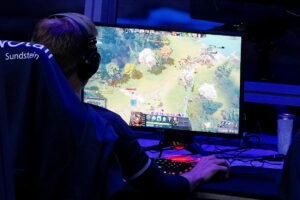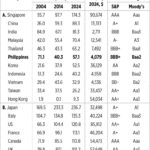
By genie yuan
Today gaming is far from child's play. The sophistication of games and the commercialization of gaming through e-sports have pushed the industry towards a lucrative growth driver that could reach $300 billion by 2028.
With more than 43 million active gamers, the Philippine gaming industry generated a record $7.16 billion in gross revenue last year. These figures stem from the fact that the Philippines has a distinct mobile-fiGaming culture first and foremost, with a strong e-sports scenefiFormally sanctioned by the Sports and Entertainment Board.
The Department of Science and Technology is also connecting with active local gamers through partnerships and collaborations. These initiatives demonstrate the understanding that gaming can remain afiCannot be a national economic contributor.
Driven by statewide implementation of 5G and greater aspirations for digital infrastructure, this development will coincide with the broader digital transformation in Philippine society. In fact, MarkEntel estimates that revenue in the local cloud gaming sector could reach $16.57 million by 2030, quadruple its current level.
However, with rapidly increasing demand, the onus is on developers and studios to deliver smooth, scalable, and internationally competitive gaming experiences.
Changing player experience
Hindu ritual of worshipfiArtificial Intelligence (AI) is often referred to as a force multiplier for efficiency and performance. Imagine national e-sports competitions such as the Mobile Legends Professional League enhanced by AI-powered matchmaking and interactive content, or mobile studios providing cloud gaming at scale with customized experiences.
From designing intelligent opponent behavior to procedurally generating entire environments, real-time AI deployment has begun to revolutionize game design. Now, matchmaking algorithms are able to put together increasingly balanced teams, assess players' skill levels, and predict user satisfaction with particular game modes.
In a matter of seconds, fraud detection systems can detect unusual login patterns or win rates. Generative AI also opens up new types of storytelling, where plots can react in real-time to each player's decisions, generating experiences tailored to a diverse range of preferred play styles.
Generic models also reduce the need for human screenwriters by creating realistic voice exchanges and infinite search lines. Additionally, retrieval-augmented generation (RAG) can assist in-game AI to improve and maintain contextually relevant responses.
These advancements in gaming experience are totally achievable and much less intimidating than they look, but it will depend on whether studios in the Philippines have the data architecture to realize them.
meeting customer demand
Gaming has evolved remarkably. Where games were once just about running, jumping or shooting, today they blend social engagement, user-generated content, branded partnerships and even real-world purchases – sometimes in the same session. Players switch between devices and network connections, but they won't compromise consistent performance and real-time personalization.
If scheduled server maintenance practices or unexpected data refreshes get in the way of their gaming experience, users' trust in the platform can quickly be eroded. It's not surprising, then, that Couchbase found that many studios have day-28 retention rates as low as 6.5%.
In the Philippines, the problem is exacerbated by unpredictable internet performance. Despite average speeds of 58.37 Mbps for mobile and 103.71 Mbps for fixed connections, connectivity remains a major challenge. To meet these expectations, studios and developers must plan for extreme performance, stable uptime, and quick response.
next wave of gaming
There is a golden opportunity for developers and studios to leverage AI to personalize in-game content and manage player trust and fairness in real-time.
These state-of-the-art methods, when combined with memory-fiFirst, a high-performance database that employs event-driven triggers and accelerated data storage gives developers the ability to quickly adapt to the environment. Whether that means adding a surprise event for a holiday promotion or modifying item drops for a team with limited resources, developers have the agility to keep gamers' attention.
This is how Germany-based global gaming powerhouse Lotum, which has over 800 million downloads worldwide, was able to guarantee uninterrupted performance for its users even when dealing with unreliable network connectivity. Lotum's games are available on Android, iOS, and multiple social network platforms, so it was extremely important to keep gamers connected across multiple devices.
The studio was able to achieve this with the help of a cloud-based NoSQL database-as-a-service, giving them speed, flexibility, and real-time analytics while reducing administration efforts.
This allows players to easily switch devices and maintain their progress, with the system automatically syncing data once the connection is restored. It's easy to see how this could work in Philippines Mobile-fiThe first player base – and how developers and studios can take advantage of this opportunity.
Powering the next generation of gaming
Filipino studio aims to gain first-mover advantage fiFirst look inside and ask an important question: Is their backend built to provide low latency, seamlessly sync across devices, scale during sudden traffic spikes?fiIncreasing C, Integrating AI, and Upholding Responsible Gaming Standards?
In a market that is competitive, mobile-first and increasingly regulated, removing the burden of infrastructure is the key to unlocking creativity. by trusting a universityfiWith an ED platform designed for performance at scale, local developers can focus on crafting unforgettable, locally immersive experiences, while ensuring their games meet global expectations for speed, fairness, and engagement. The opportunity to lead starts with building on a strong data base.
Jinny Yuan is Regional Vice President, APAC Japan at Couchbase.










